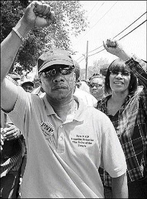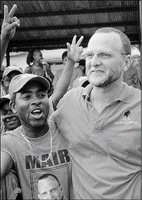 Robert Buddan
Robert Buddan
Sixty-five per cent of the citizens of North East St Catherine believe the country is going in the wrong direction. This is quite a bit more than the 49 per cent in West Portland, who thought so, leading up to that by-election in March. The intervening factor here must be the Budget and the round of tax increases it brought, along with the continued deterioration in the economy. Only 15 per cent of those surveyed in NE St Catherine think the country is going in the right direction and 20 per cent were not sure, according to the Don Anderson survey conducted in June.
The survey showed other things. The country's most pressing problem is crime and violence. Thirty-five per cent thought it was the most troubling problem. Unemployment came out at 28 per cent. In the current economic climate, unemployment is rising but crime and violence is not a result of the global economic crisis. It is a problem of law and order and has been for some time.
The high cost of living was a rising concern. Twenty-five per cent identified this as the most pressing concern. This is not surprising. After a number of years of single-digit inflation, prices have begun eating away at the Jamaican consumer again. The official statistics show that inflation was 28 per cent over 2007 and 2008 combined.
greatest concern

Granville Valentine looks a picture of determination after being nominated as the People's National Party candidate for North East St Catherine. - File Photos
More pertinent to NE St Catherine is how people of that constituency feel about the most pressing problems of the community. Far and away is unemployment. Fifty-three per cent singled out unemployment as the greatest concern of the community. Crime and violence, on the other hand, was of minimal concern, a worry for just two per cent. Bad roads were a greater problem (16 per cent) and cost of living was a problem for eight per cent.
This is not a good time for the governing party to go into a by-election. The election is, of course, forced on the Jamaica Labour Party (JLP) by a court decision. The JLP will hope that its margin of over 900 votes in the 2007 elections in NE St Catherine will hold. Two weeks ago the People's National Party (PNP) seemed to feel that it would hold easily. However, the fact that so many more people feel the country is going in the wrong direction now is one of the reasons it is feeling that it could actually win.
There are other reasons. The Anderson poll shows that 44 per cent felt that the Government was doing a bad or very bad job. Twenty-four per cent thought it was doing a good or very good job. It is the 33 per cent in the middle who were not sure that the JLP has to convince.
The rating for the JLP candidate is almost identical on the negative side. Forty-three per cent thought he was doing a bad or very bad job. However, Mair does better than the Government, as a whole, on the positive side. Thirty-one per cent said he was doing a good or very good job. For the sake of comparison, 32 per cent of the people of West Portland had thought that Vaz was doing a bad or very bad job and 21 per cent felt that he was doing a good or very good job.
In the present case of St Catherine, those who were not sure about Mair make up a sizeable 26 per cent. They are still to be convinced if Mair is to legitimise his seat.
The PNP could capitalise here. Respondents in the Anderson survey gave Mair a failing grade. Forty-seven per cent did. Thirty-four per cent gave him a passing grade and 19 per cent were not sure how to grade him.
final outcome

Gregory Mair (right) celebrates with jubilant Jamaica Labour Party supporters at a party meeting.
How people feel is one thing. Convincing them to vote and influencing who votes, and how they vote, is ultimately the key thing. Campaign organisation, use public and private resources, money, promises and assistance to voters are all important in determining the final outcome.
Another factor is knowledge of the PNP candidate, Granville Valentine. Anderson's poll shows that if Phyllis Mitchell, the PNP candidate against Mair in 2007, contested against him now, she would win comfortably by 46 to 30 per cent. Mitchell, however, did not want to contest and, I understand, was not keen to contest in 2007 either. The contest between Mair and Valentine would be close, other things being equal. Mitchell is much better known and has a longer record of service than Valentine. If her support could be transferred to Valentine then Mair would be in trouble.
The election, and other by-elections like it, is important to determine the future government of Jamaica and respect for constitutional rule in Jamaica. Many seem to have missed this basic point. Some say the election is a waste of time and money. Others criticise the role of the court. Mair, himself, said his supporters were upset about it. He calls the decision that he violated the constitution, and should re-run the election, a 'hiccup''.
There has never been a survey showing if people think the Jamaican constitution is a major problem in their lives. Had there been one, they would most likely list crime and violence, unemployment, cost of living, poverty, roads, water, and such as the country's main problems. Certain attitudes towards the dual citizenship issue show that Jamaicans do not have a well-developed constitutional culture. This in turn expresses itself in the failures of law and order, justice and ultimately constitutional reform.
Benedict Anderson once wrote that a nation was an "imagined community" because its members never actually meet and know each other and do much with each other in any practical and personal way. I wonder if nations like ours can be said to have imagined constitutions. In this sense, the constitution exists merely as a mental construct that plays little role in people's everyday lives. They've never read it, wouldn't understand it, never seen it and don't consciously live by it.
Just as nation-building requires creating a deep and abiding sense of real community where people know, live and work with each other as interested stakeholders, we need to build a culture in which the Constitution is a real and living part of people's lives. When we do this we will have a culture that takes law and order, justice, contract and the Constitution more seriously.
nationhood and constitution
If we could make the connection between the rights and responsibilities of citizenship and the constitution, we might be able to show people how their actions, each day, towards each other, the law, and the government relate to the constitution. We might be able to demonstrate that violence, tax evasion, utility theft, company and voting fraud, political corruption and many illegal private and public acts, result from having a merely imagined sense of nationhood and constitution.
The 18,000 voters in NE St Catherine and all members of parliament need to take the Constitution seriously, regardless of who wins elections. Leaders set bad examples for law, order and justice when they complain that court decisions for by-elections represent a coup attempt against the Government, by-elections ordered by the court are a waste of time, and that the challenge to one's eligibility for membership in Parliament, on the basis of dual citizenship, is merely a hiccup. That culture must change.
Robert Buddan lectures in the Department of Government, UWI, Mona. Email: Robert.Buddan@uwimona.edu.jm or columns@gleanerjm.com.



